Gordon G. Chang's Blog, page 7
February 10, 2016
China Communist Party Elder Speaks Out Against Censorship
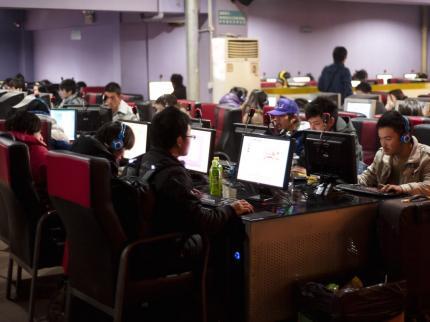
Censorship has gone too far, contends Zhou Ruijin, 76, in an essay published in China in January and on Phoenix TV’s ifeng.com early this month. “To be frank, some leaders in the party’s propaganda department were managing the press like how they would manage a train schedule, directly intervening in the approach and procedure of news reporting,” he wrote.
Zhou, a leading liberal writer in the 1990s, attacked today’s propaganda chiefs for taking down offending websites and deleting postings, calling these actions contrary to the concept that the Communist Party govern the country according to law. Moreover, he condemned “waves of campaigns, strict clampdowns, and public shaming,” the last a reference to the parading of people making Cultural Revolution-style confessions on television.
“In a phase of social transition, it is normal that there are different views and discussions in the field of ideology, that the public air their own opinions on deepening reforms,” wrote Zhou. “They can only be guided, but not repressed.”
History, unfortunately, shows the Chinese people can, in fact, be repressed. The brutal Qin Shihuang, China’s first emperor known for burning books and burying scholars, said his dynasty would last forever. “From the second generation to the ten thousandth, my line will not end,” he boasted. It ended three years after his death.
The Chinese people can remain quiet for decades—and sometimes centuries—but then they erupt. Zhou’s prescription to avoid eruptions is to relax controls, but Xi Jinping, China’s ruler, has gone far in the other direction, first demanding obedience and now, uniformity. He has promoted “ideological purification” and brought Mao Zedong, the founder of the People’s Republic, back to the center of the country’s official discourse. In short, Xi promotes the policies that Zhou condemns.
Zhou’s critique is notable because he once served as deputy editor of People’s Daily, the Communist Party’s self-described mouthpiece, making him a leading figure in the state’s propaganda apparatus. Yet he recognizes that times have changed in China and that the 1950s-type information controls favored by Xi cannot succeed today.
As Xu Youyu, retired from the prestigious Chinese Academy of Social Sciences, notes, “No matter how hard the authorities want to suppress, they can’t just do what they want anymore because there is consensus in society on constitutional rule and the protection of free speech.”
The notion of a mass ruling organization, like the Communist Party, fulfilling its historical destiny has few adherents in China today. Although there are no reliable polls measuring political opinion in that country, it is nearly certain that by now most Chinese reject the one-party state as appropriate to their modernizing society. For now, party censorship, is tolerated, not supported and has few defenders outside the political elite.
The Chinese accept censorship only because they fear Xi Jinping’s coercion and repression. Zhou’s lone dissent is important because, at great personal risk, he is opening space that could broaden and embolden the national conversation.
Perhaps most important, Zhou shows us that the Chinese people can overcome fear. And in China, the loss of fear is the first step to progress.
OG Image: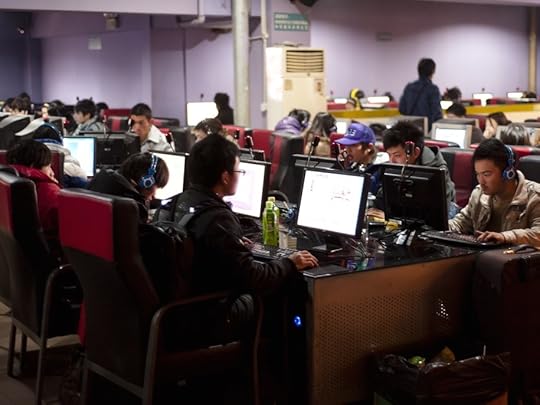 Asia PacificChina
Asia PacificChina
February 3, 2016
Where Is China’s Central Bank Chief?

In China and elsewhere, there is increasingly intense speculation as to why Zhou Xiaochuan, the highly acclaimed governor of the People’s Bank of China, has for months been silent about the renminbi, the ailing Chinese currency. His silence and absence is most unusual and apparently prompted IMF Managing Director Christine Lagarde to chide Beijing at Davos last month for the government’s inadequate communication with financial markets.
Zhou, notably, stayed away from the central bank’s August 13 press conference, held just two days after the shock devaluation of the yuan, as the Chinese currency is informally known. Though he appeared at a G-20 finance meeting in Ankara in early September, he has since vanished. That he skipped Davos, raised eyebrows.
Central bankers are, of course, expected to be front and center when their currencies are under pressure, as the renminbi has been since mid-August. But as Hong Kong’s South China Morning Post noted Sunday, “no one’s seen or heard from Zhou.”
There are various theories that account for the Zhou’s absence. Jonathan Fenby, the author, journalist, and co-founder of Trusted Sources, believes that Xi Jinping, the Chinese ruler, has consolidated decision-making in his own hands. Accordingly, senior officials, Zhou among them, have been cut out of the loop. If Fenby’s correct, it is likely that Zhou is either prevented from speaking or perhaps chooses to remain silent rather than challenge Xi’s policies with which he might disagree.
Scott Kennedy of the Center for Strategic and International Studies, the Washington, D.C. think tank, shares this view. “As policymaking becomes more centralized, there is less internal discussion and consensus-building,” he said to the Post.
Another theory is that China’s Communist Party—the country’s first and only permitted authority—has yet to decide on a strategy for dealing with the substantial pressures and attacks on China’s currency, coming from within and from outside the country. In this case, neither Zhou nor anyone else would speak in public before a consensus and a decision would be reached.
There’s a bigger story here, however. In recent weeks, especially as China’s economic problems have unfolded, analysts have questioned the competence of China’s technocratic leadership, which not long ago was universally admired.
Zhou, the longest-serving central bank chief in the G-20, is without question, able. His long record of achievement strongly suggests that his absence and silence, and the evident government missteps, cannot be attributed to incompetence on his part. Rather, they have much to do with an inept political system and culture that constrains capable officials.
Whatever is the truth—and it is difficult to know—markets are waiting for Zhou to emerge from the shadows. He may not have sufficient answers for China’s increasingly intractable financial problems, but his engagement is becoming a precondition to a return to confidence in China.
 Asia PacificChina
Asia PacificChina
January 27, 2016
China-Iran Upgrade Their 'Comprehensive Strategic Relationship’

Chinese President Xi Jinping just wrapped up his three-nation tour to the Middle East with a visit to Iran.
The global narrative is that Beijing and Tehran are strengthening relations and for good reason: during the visit the two sides inked 17 accords, treaties, and letters of intent.
The two republics—one “People’s” and the other “Islamic”—also declared they had agreed, in the words of the official Xinhua News Agency, “to elevate their ties to a comprehensive strategic partnership.” And they appear to have meant it. As Xi’s Iranian counterpart Hassan Rouhani said on Saturday, “Today we discussed the strategic relationship between both countries, setting up a comprehensive 25-year plan and also promoting bilateral relations of up to $600 billion over the next 10 years.”
Xi and Rouhani may have big plans, but with respect to the economic dimension, China just might not be the partner Iran envisions. Tehran, for instance, is looking to China, already the biggest purchaser of its crude oil, to buy even more of it. Now that sanctions on such sales have been lifted, Iran wants the Chinese to buy most of its extra output of 500,000 barrels a day.
All projections show that China’s oil needs will grow substantially over time, but that may not end up being the case. In fact, virtually all analyses of the Chinese economy from the beginning of last year have proved overly optimistic. Yes, last year the country’s crude oil imports rose 8.8 percent, but that does not appear to have been due to the needs of a growing economy or consumer demand. Reuters calculates China’s implied oil consumption increased only 2.5 percent last year. In 2015, the country consumed about 10.3 million barrels per day..
Why are imports rising far faster than consumption? For one, China is increasingly refining imported crude oil and selling it abroad. The more important reason, however, is that Beijing is taking advantage of low prices to add to its strategic petroleum reserve. In December, the official National Bureau of Statistics reported that by the middle of 2015 the reserves had reached the 191-million-barrel mark, well above the 91 million barrels announced in November 2014. So, a significant portion of China’s purchases had little to do with current demand.
China still has a long way to go before it tops out its storage tanks and caverns. The country has announced a reserve target of 550 million barrels by 2020. Therefore, Beijing will continue to buy oil from Iran and others .
Nonetheless, Iran’s high expectations for a rewarding economic relationship with China may not materialize – as an increasing number of China’s trading partners, particularly in the developing world, are learning. The main reason is that China’s manufacturing sector is slowing dramatically -- as is its economy as a whole (some estimates say the economy grew at 1 percent last year, not the government’s reported 6.9 percent).
Further downward pressure on the demand for oil is being driven by China’s pollution problems, which are forcing local governments across the country to pull vehicles off the road. In addition, China is increasing efforts to get more energy from nuclear power and renewable sources. These combined trends will conspire to further reduce China’s energy consumption. And one final point: Beijing, currently spending dollars at an alarming rate to defend the renminbi, may not have the cash to make massive energy purchases to fill its strategic reserve.
As Beijing and Tehran continue to challenge the international order, and especially America’s role in it, both have geopolitical reasons to strengthen ties in fundamental ways, but their economies may not mesh as easily as their leaders now think. Iran’s mullahs might want to hedge their oil bets.
OG Image: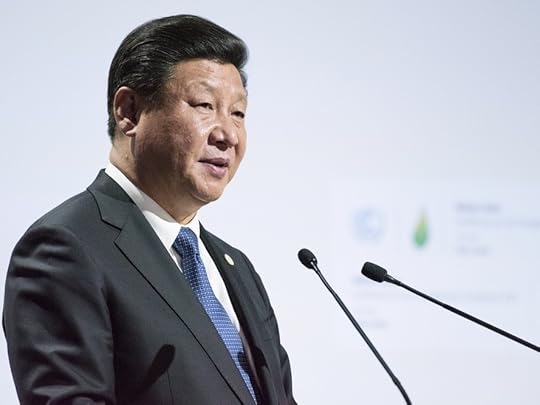 Asia PacificMiddle EastChinaIran
Asia PacificMiddle EastChinaIran
January 25, 2016
China's Economy Slides, Stocks Tumble, Capital Takes Flight
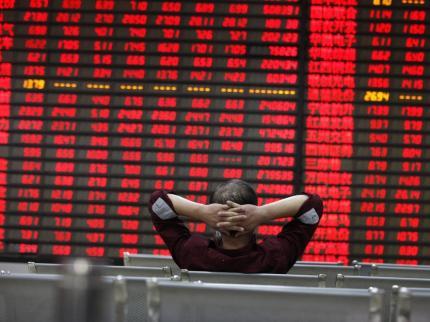
Stocks around the world have generally tumbled this month, but last Tuesday was a bright spot as equity markets surged. Then, Beijing's National Bureau of Statistics reported its first estimate of China's gross domestic product for 2015.
The official agency pegged last year's growth at 6.9 percent. The percentage increase, roughly in line with analyst expectations, was the lowest in 25 years.
So why does a dour report trigger optimism among stock investors? Investors now believe the Chinese central government will step up stimulus to restart growth, which has been falling since 2011. Furthermore, there is a hope that state entities and government-backed funds in China—the so-called “National Team”—will begin a new round of buying in China’s two share markets. Both developments are considered good for Chinese stocks.
And what is good for stocks in China is often thought to be good for stocks everywhere else.
The only trouble with this optimistic narrative is that the Chinese government can no longer create GDP. Six reductions in benchmark interest rates since November 2014 and five reductions in the reserve requirement ratio since last February have had no noticeable effect. Monetary stimulus, therefore, appears to be tapped out. Large increases in fiscal spending—especially at the end of last year—have also not halted declining growth.
The fundamental problem? A lack of demand for money.
You can see this for yourself if you go to the Pudong district of Shanghai. There, you will find, in an out-of-the-way location, the Shanghai Pentagonal Mart, a shopping mall in the same shape—and containing almost as much floor space—as the Pentagon. The Chinese building, however, has been virtually empty since it was completed in 2009.
The Pentagonal Mart—not the largest building in China by any means—cost more than $200 million, and someone has to pick up the tab. That’s hard to do when there are virtually no tenants and no rental income.
China has massive empty development projects across the country, and eventually the debt incurred to build them has to be paid back. Analysts like to say that Beijing has the world’s largest foreign currency reserves and so it does not have to worry. That’s sloppy thinking because the central government can’t just give borrowers the nation’s cash and, in any event, borrowers do not need dollars, euros, pounds, or yen. They need renminbi.
As history shows, local currency crises are always harder to resolve than foreign currency ones, and now China appears certain to be on the edge of a domestic downturn. Some, such as Jonathan Anderson of Emerging Advisors Group, think Beijing has a half-decade to sort things out, but others are not so sure. “They absolutely have no room left for further debt accumulation,” said Rodney Jones of advisory firm Wigram Capital to the Financial Times this week. “The problem is unsustainable growth and continued rapid accumulation of debt, leverage, and credit.”
Who’s right? The Chinese are giving us a hint. They are taking cash out of their country as if there is no tomorrow. Maybe, for them, there isn’t.
OG Image: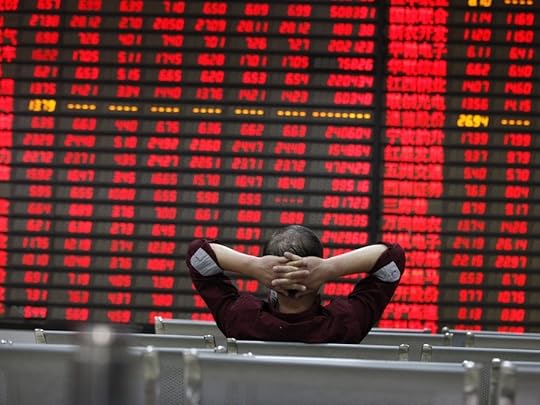 Asia PacificChina
Asia PacificChina
January 12, 2016
Will South Korea Rethink Its Nuke Policy?

On Monday, a “US official” speaking anonymously to Reuters, said the Pentagon was not thinking of reintroducing nuclear weapons to the Korean peninsula.
Earlier in the day, Seoul had suggested Washington was considering the possibility. “The United States and South Korea are continuously and closely having discussions on additional deployment of strategic assets,” South Korean Defense Ministry spokesman Kim Min-seok said.
By “strategic assets” the unnamed US official said the Defense Department was referring to nuclear-capable bombers. South Korean media had been reporting that Washington and Seoul were discussing the deployment of American B-2 bombers, F-22 fighters, and nuclear submarines to the Korean peninsula.
President George H. W. Bush in 1991 announced the unilateral withdraw of tactical nuclear weapons from South Korea and other foreign countries, and today there is virtually no apparent support in the Pentagon for redeploying them.
As a matter of actual warfighting, basing nukes in South Korea makes little sense. Van Jackson of the Center for a New American Security points out the US does not need them in Asia because of its conventional military superiority over every other nation. Nukes also tend to exacerbate disputes, make American look aggressive, risk encouraging others to deploy them, eat up resources better devoted elsewhere, and legitimize a class of weaponry that gives weak countries a battlefield equalizer.
Moreover, no one should want to put these destructive instruments anywhere close to where the North Koreans can grab or destroy them.
And with long-range, strategic platforms—like Ohio-class ballistic missile submarines that silently prowl the oceans, B-52s based in nearby Guam, or the stealthy US-based B-2s that can hit a target anywhere on earth—there is no need to actually bring a nuke onto South Korean soil.
Yet, despite everything, South Koreans continue to talk about the US adding nukes to its arsenals on the peninsula.
Why? North Korea’s nuclear weapon program, which is advancing at a steady pace, is unnerving South Koreans, and as a result has eroded confidence in the US’s ability to defend them.
In these circumstances, it is not surprising that the South Korean government has been caught conducting experiments with fissile material, such as enriching uranium and trying to reprocess plutonium, in violation of its obligations under the Nuclear Nonproliferation Treaty. The South has tried to hide its illicit activities from inspectors of the International Atomic Energy Agency, the UN watchdog, and without justification refused access to IAEA inspectors. The US thought it had convinced Seoul to give up its program, but South Korean technicians covertly kept up the effort nonetheless.
It is generally believed Seoul can develop a bomb in about a year’s time. South Korean military officials say that they can do that in six months.
And someday they just might. “Suppose you have a dangerous neighbor with a gun,” said Chung Mong-joon, a member of South Korea’s National Assembly, in 2013 at a Carnegie International Nuclear Policy Conference in Washington. “You have to take measures to protect yourself. And being a gun control advocate isn’t going to help you.” As Chung said, “Telling us not to consider any nuclear weapons option is tantamount to telling us to simply surrender.”
The US way of calming down the South Koreans is to fly B-52s over their country at times of stress. A lone B-52 on Sunday made a low pass over Osan Air Base, about 40 miles from Seoul, a message to a North Korea that had detonated a small-yield weapon on Wednesday. The US Air Force also sent a B-52 over South Korea after the North’s previous detonation of an atomic device, in 2013.
A fly-by with a single strategic bomber is better than nothing, but it is no substitute for an effective North Korea policy, which Washington has yet to develop.
The official talking to Reuters said reintroducing nukes might “escalate into an arms race, a very dangerous arms race, in the region,” but the South Koreans know that comment ignores reality. The North Koreans are racing to build nukes as fast as they can, and Washington is stopping Seoul from doing the same. That American policy may not be sustainable for long.
OG Image: North AmericaKoreaUSSouth Korea
North AmericaKoreaUSSouth Korea
January 6, 2016
Have Chinese Agents Abducted Hong Kong Publisher, Book Sellers?

The case of five missing Hong Kong residents connected to a Hong Kong publisher and bookshop took a strange turn Monday when the wife of one of the missing individuals withdrew her request for police assistance. Choi Ka Ping said she had heard from her husband that day and no longer needed help.
The police, however, said they would continue the investigation into the disappearance of the husband, Lee Bo.
The first to disappear was Gui Minhai, owner of Mighty Current, a publishing house that since 2012 has released about 80 books highly critical of China’s Communist Party. The last known contact from him was an e-mail message sent on October 15 to a printer from the Thai resort of Pattaya.
A few weeks later, on November 5, three of Gui’s colleagues were reported to have vanished while in Shenzhen, across the border in what people in Hong Kong call “the mainland.” The missing are: Lui Bo, the general manager of Mighty Current; Cheung Jiping, Mighty Current’s business manager; and Lam Wing-kei, the manager of Causeway Bay Books, a shop partially owned by Mighty Current. The store, opened in 1994, has been popular with Chinese tourists looking for political books unavailable in China.
And most recently, on December 30, Lee Bo, a shareholder in Causeway Bay Books, also disappeared. He was last seen near Mighty Current’s warehouse in an outlying district of Hong Kong. Ms. Choi reported him missing January 1.
Ms. Choi said her husband had called her the night he went missing. “He said he will not be coming back anytime soon,” Choi told a cable station. “He said he was assisting an investigation. I asked him if it was about the previous cases, he said yes.”
Lee phoned Choi again, on Saturday, January 2. During that conversation she heard a voice in the background say “there would be no problem if you cooperate.” Lee spoke to her in Putonghua, the national language of China, not Cantonese, the dialect of Hong Kong. Ms. Choi said his choice of language was unusual.
Tellingly, the caller ID of the phone Lee used showed the call was made from Shenzhen. If Lee in fact called from China, there is good reason to believe he was abducted. Hong Kong authorities report that there is no immigration record of Lee leaving Hong Kong. Lee did not take his home-return permit, which he would have needed to enter the mainland.
Indeed, the South China Morning Post reported on Sunday that Lee’s wife thought Chinese agents had abducted him.
On the same day Lee faxed a handwritten letter to his bookstore. “I had to handle the issue concerned urgently and cannot let outsiders know it,” he wrote. He also said he “returned to mainland my own way and am working with the concerned parties in an investigation which may take a while.” Lee also noted: “I am now very good and everything is normal.”
Nothing about this case is “normal.” On Monday, in this whirlwind of activity, Ms. Choi said she no longer required police assistance to resolve the sudden and mysterious disappearance of her husband. What happened? Her husband’s fax seems highly likely to have been sent under duress. In all probability, the Chinese convinced Ms. Choi that she would see her husband sooner if she cooperated.
Hong Kong is part of the People’s Republic of China, but mainland law enforcement personnel have no jurisdiction in that city. That hasn’t stopped Chinese agents from engaging in covert activity in Hong Kong, which began when the British Union Jack was lowered over Hong Kong and China’s five-star flag replaced it in 1997. For years Hong Kong people remained silent about these violations of their autonomy. As Chinese espionage has become bolder and more visible, however, residents began talking. Kidnapping two people connected to a high-profile business, after all, marks a new arrogance and an increased threat to Hong Kong’s freedoms.
Beijing’s ongoing efforts to smother Hong Kong’s haven status have prompted a response. In the Mighty Current matter, there have been, for instance, demonstrations outside Beijing’s representative office in Hong Kong over the missing residents on Sunday and Monday. The matter has consumed Hong Kong’s media in the past week.
In the end, Beijing has the power to do whatever it wants—the city’s political establishment represents China and not the people of Hong Kong and the People’s Liberation Army has a large garrison there—but Chinese officials are having an increasingly difficult time controlling popular backlash.
Xi Jinping, who has handled the Hong Kong portfolio for the Communist Party’s Politburo Standing Committee in recent years, has apparently chosen to confront rather than charm the city’s population. There is, for Beijing, likely to be a price.
 Asia PacificChinaHong Kong
Asia PacificChinaHong Kong
December 30, 2015
Japan, South Korea Reach Historic Agreement on ‘Comfort Women’
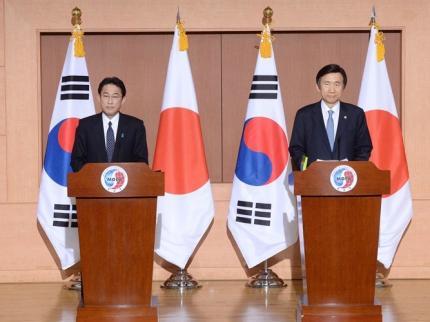
On Monday, Japan and South Korea, in parallel statements of their foreign ministers, agreed to a “final and irreversible” settlement of the so-called “comfort women” issue.
During Japan’s colonization of Korea last century, Korean females had been forced to provide sexual services to Japanese soldiers in military-run brothels.
Pursuant to the deal, Tokyo agreed to pay 1 billion yen ($8.3 million) into a South Korean fund for the 46 surviving comfort women. More important, Japan’s foreign minister, while in Seoul, delivered the apology of his country’s prime minister. Fumio Kishida said Shinzo Abe “expresses anew his most sincere apologies and remorse to all the women who underwent immeasurable and painful experiences and suffered incurable physical and psychological wounds as comfort women.”
The Japan-South Korea arrangement, in the works for months, represented an act of courage for Abe but especially for his South Korean counterpart, President Park Geun-hye. It was also a triumph for American diplomacy. Washington in recent years had been trying to stop a downward spiral in relations between Tokyo and Seoul.
The US has military alliances with both Japan and South Korea, but the two countries are not allied to each other. For years, they were barely on speaking terms. In fact, Ms. Park had refused to even meet with Abe for more than three years. When she finally agreed to a summit, which took place November 2, she treated him as rudely as possible under the circumstances.
Most commentary this week has focused on Japan needing an agreement with South Korea, and it is true that Tokyo wanted acceptance in the region and another ally in its struggle with China. In reality, however, Seoul had more urgent—and more fundamental—reasons to come to terms.
Most important, South Koreans realized that they needed Japan more than the other way around. Any causal glance at a map makes it clear that the North Koreans—especially if they had Chinese help—could overrun the entire Korean peninsula well before American reinforcements could arrive if Tokyo prohibited the use of American bases in Japan for the defense of South Korea. South Korea, in short, is extremely hard to defend without Tokyo’s active cooperation.
And the South Koreans, because their government has indulged the widespread hatred of the Japanese in society, have put the security of their country at risk. Seoul, for instance, refused to sign an intelligence-sharing agreement with Japan in June 2012, pulling out at the last moment. And Japan and South Korea have yet to integrate their air defenses as they should have done by now.
Moreover, Seoul’s unseemly courting of China in recent years created concern in Washington that it was acting inconsistently with its alliance responsibilities. Ms. Park had to do something to tilt back, and resolving the comfort women issue, which she had exacerbated earlier in her term, was an obvious thing to do.
Elite opinion in Seoul—and even among the South Korean electorate as a whole
—was starting to see the need to end a spat that was mostly hurting South Korea, and in any event Park’s pro-Beijing policies were starting to come apart anyway.As Satoshi Amako at Waseda University in Tokyo noted, South Korea was looking to China to restart growth and help rein in North Korea. Now that the Chinese economy is slowing and Beijing’s ties with Pyongyang are obviously deteriorating, China appears much less useful to the South Koreans.
Park deserves credit for Monday’s agreement, and now her government and Japan have the opportunity to build a strong relationship. More important from her perspective, she has sponsored an agreement that allows her country to reverse a dangerous course. She did not create anti-Japanese sentiment in South Korea, but she stoked it. Now it is good that she is undoing damage she helped create.
Some elements of South Korean society have already denounced the deal, and, given Japan’s horrific crimes against the Korean people, that is understandable. Yet South Koreans can continue to dwell on the injustice of the past or choose to defend their country from the threats of the present. They cannot do both.
Photo: Korean Ministry of Foreign Affairs, Cheong Wa Dae
OG Image: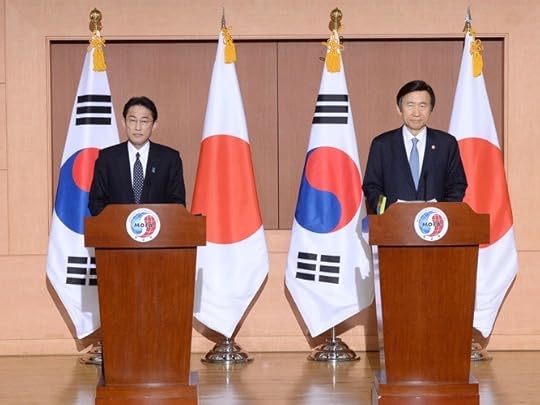 Asia PacificJapanKoreaSouth Korea
Asia PacificJapanKoreaSouth Korea
December 24, 2015
China Threatens to Shoot Down Australian Planes

On November 25th the Royal Australian Air Force conducted a “routine maritime patrol” in the South China Sea as a part of Operation Gateway, a program of periodic flights. An AP-3C Orion surveillance plane flew near a reclaimed Chinese feature in the Spratly island chain, in the sea’s southern portion.
In response, the Global Times, a Beijing-based Communist Party newspaper, published an editorial that essentially threatened to start a war: “It would be a shame if one day a plane fell from the sky and it happened to be Australian.”
Australian Defense Minister Marise Payne responded to Beijing’s bluster with remarks that left something to be desired. “We always navigate in a very constructive way in the region,” she said.
Although it’s good that the government in Canberra has joined the effort to protect the global commons, the minister’s tepid response to Beijing’s thinly disguised threat to shoot down a plane over international waters is disheartening.
Of course, Payne was just following the playbook of the US and other countries in the region in trying not to provoke Beijing. A calm, measured response is almost universally considered the correct course of action.
Yet those “responsible” and “constructive” reactions have failed to halt or even slow Beijing’s attempts to enforce its expansive—and in many cases unsupportable—territorial claims, not to mention end its threats to start a war with regional powers determined to preserve international rights to freedom of the seas.
The threat of the Global Times, unfortunately, was no isolated pronouncement. In late October Admiral Wu Shengli, chief of China’s Navy, told his American counterpart that war might result over freedom of navigation exercises, such as the one conducted by the USS Lassen near Subi and Mischief Reefs, also in the Spratlys. Like Payne, America offered a low-key reaction to the threat.
Washington policymakers may think they are avoiding escalation by not responding in kind to such rhetoric, but they are mistaken. If the US and Australia hope to keep the peace, they must make it clear to China that they are prepared to use whatever force is necessary to protect their vessels and aircraft and uphold the right of free passage.
Beijing is not just another claimant in the South China Sea. It is becoming a revisionist power, one routinely threatening to end East Asia’s decades of peace.
Maybe, at this late date, there is nothing the Australians can say to deter China. But if Canberra’s measured remarks come off as weak in Beijing, China’s hard-liners will be emboldened—or worse.
OG Image: Asia PacificChinaAustralia
Asia PacificChinaAustralia
December 17, 2015
US Diplomat is Roughed-Up in Scuffle in Beijing
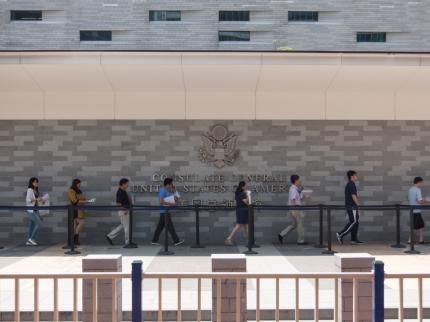
On Monday, unidentified men, many of them wearing smiley-face stickers on their jackets, shoved journalists so that they fell onto American diplomat Dan Biers as he was reading a statement in Beijing about the persecution of Chinese human rights lawyer Pu Zhiqiang. Biers, a deputy political counselor at the US Embassy, had to stop reading but was later able to finish.
The incident took place while Biers was standing outside Beijing No. 2 Intermediate People’s Court, where Pu’s trial is being held.
The men, almost certainly from Beijing’s Public Security Bureau or a similar unit, also interrupted a European Union delegate. Diplomats from 10 countries other than the US were on hand for the proceeding—“the capital’s biggest political trial in two years,” according to the Wall Street Journal’s “China Real Time Report”—and many of them were also harassed.
Foreign Ministry spokesman Hong Lei seemed to confirm that the goons were Chinese agents. “Public security organs in China maintain order in accordance with the law,” he said in response to the incident at the daily media briefing. “People at the scene should try to cooperate with them, instead of the other way around.”
The Journal called the men “plainclothes thugs.” The paper was correct when it labeled the action of the Chinese police and those out of uniform “aggression.”
Biers refused to comment on the incident. State Department spokesman John Kirby responded immediately, however, saying the US was “dismayed with the physical harassment of Chinese and international observers, including journalists and diplomatic personnel outside the courthouse.”
Kirby’s words are a start, but they are hardly sufficient. The violation of an American diplomat is a violation of the US, and the State Department needs to start treating it as such.
Because there is no reciprocal action Washington can take—democracies do not beat up representatives of foreign governments—the Obama administration should start thinking of responses that would make an impression on China’s increasingly belligerent leaders. One such response would be the expulsion of a Chinese diplomat.
That may sound like an overreaction, but something needs to be done. An increasing number of observers see China’s mistreatment of foreign diplomats not as a sign of regime insecurity but as an indication of Beijing’s confidence that it can do as it wants.
The US, therefore, needs to raise the stakes before Beijing begins thinking it can get away with conduct that injures Americans—and results in more egregious violations of American sovereignty.
OG Image: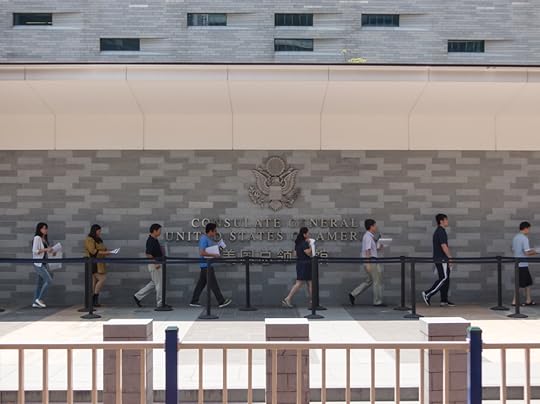 Asia PacificNorth AmericaUSChinaEuropean Union
Asia PacificNorth AmericaUSChinaEuropean Union
December 10, 2015
‘Airpocalypse’ in Beijing

Monday afternoon, the Beijing municipality issued its first-ever red alert for air pollution. The warning, the highest in a four-level system, expires at noon on Thursday.
During this alert, primary and secondary schools are closed, as are kindergartens. Individual cars are only allowed on the road on alternate days. Government offices must reduce car use by 30 percent. Public transportation operates on extended schedules. Heavy trucks must stay off the roads. All outdoor construction is stopped. Factories are required to close for two days. Fireworks and barbecues are banned.
The air in Beijing is now a dark gray. And it is deadly. PM2.5 readings, which measure the most hazardous particulates, exceeded 900 in recent days. The World Health Organization’s safe level is 25. In China, some 4,000 people a day die from bad air, according to one study.
Beijing residents speak of the situation as the “airpocalypse” or “airmageddon.” One performance artist, who goes by the name “Nut Brother,” actually created a “smog brick” by vacuuming up Beijing air with an industrial vacuum cleaner that he wheeled through city streets and public spaces. Satire in the capital is almost as dark as the atmosphere.
Citizens are angry that authorities did not declare a red alert last week, when there were five consecutive days of dense smog beginning November 27th. It’s a safe bet that authorities were reluctant to admit the severity of the situation. Xinhua News Agency, an official outlet, said the red alert came after an orange one (the second-highest level) but a yellow alert (one level down from that) was in effect on Monday, just hours before the declaration of the red one. In other words, public pressure likely forced the authorities to move from near the bottom of the scale to the top in almost one go.
Every year, the air in the Chinese capital seems to get worse. Can anything be done? For years efforts have been made to relocate heavy industry out of the Beijing municipality. More recently, the government has promised to close all coal-fired generating stations by 2017. There have been bold declarations by national and municipal leaders—even a “war on pollution” announced last March.
There is only one thing missing: bottom-up pressure. Authoritarianism is preventing the change that everyone wants, and environmentalists know this. Take Ma Jun, perhaps China’s best-known activist not in prison. He is now talking about people mobilizing to support beleaguered environmental officials against polluters.
That sounds fine in the pages of London’s Guardian newspaper, where you will find Ma’s important words, but don’t expect to read citizen calls for action in People’s Daily, the Communist Party’s flagship publication. In a democracy, citizens form groups, buttonhole officials, protest when they’re angry. In China, the party has recently begun an intensified campaign against nongovernmental organizations. People almost never get to meet those who rule them, and spilling out into streets is usually dangerous.
There is one solution to dirty air in China, however. It’s called a cold front. One of them is expected to arrive Thursday. More smog, however, is forecast for the capital beginning December 14th.
OG Image: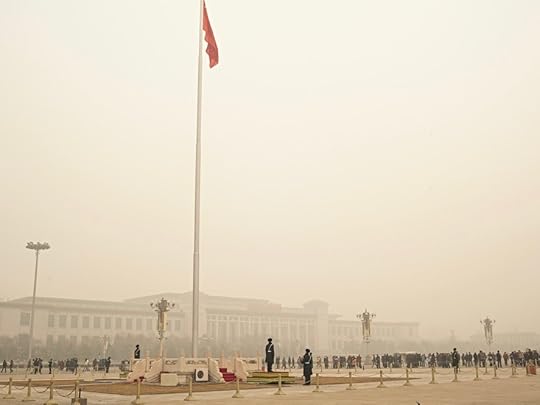 Asia PacificChinaPollution
Asia PacificChinaPollution
Gordon G. Chang's Blog
- Gordon G. Chang's profile
- 52 followers



